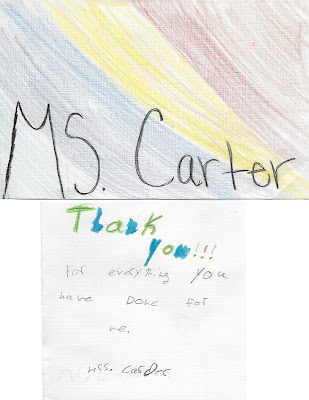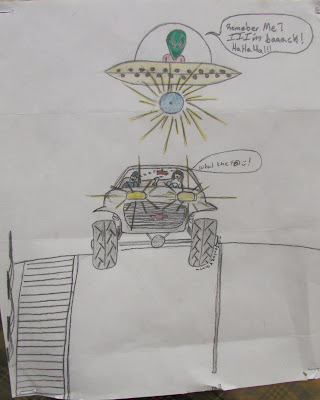Was that really fourteen months ago?
Yesterday was the first day of school, here in our little town. And it was the second time I wasn't a part of it, as I begin my second year of retirement.
Do I regret retiring three years before I'd originally planned? No. I always tell people this is the best gift I ever gave myself. It really is. And my retirement benefits are more generous than I'd expected, so there's no financial reason for regret.
Do I miss being a teacher? Actually, I'm often a little shocked at how little I miss it, how little I even think about it. Of course I cared about my students, and of course I found satisfaction in doing a job that I enjoyed and did well. I have no doubt that I would have missed teaching if I'd retired a few years earlier.
Now, however, the time had come. I knew without a single doubt that it was time. So I retired and never looked back.
After writing hundreds of IEPs over the years, here I'm directing my final IEP meeting!
The principal is at the end of the table. Our counselor for grades 9-10 took the pic.
May 19, 2017
I don't miss the paperwork at all. As a special education teacher, our required documentation was endless and thankless. No matter how hard we strove to write each students' annual Individual Education Plan (IEP) to state and federal specifications, auditors always found some new thing we needed to fix. Including when, on two occasions, I showed the auditor their very own instructions on a sample page, using exactly the same words I'd used, because I'd followed their instructions to the letter. Maybe they didn't like my font choice?
When I began teaching regular freshman and sophomore English classes during my final three years, the paperwork became a true nightmare. Now, in addition to writing IEPs (each one, a minimum fourteen-page legal document, took at least two days to prepare), the mountains of essays and reports to be graded kept me after school until about 6:00 most days.
I don't miss the meetings, either. IEP meetings, which rarely lasted less than an hour and often much longer, could be emotionally-charged, stressful affairs. Everyone wants to help students succeed, but often the participants have different ideas of how to make it happen. It was my job to manage the meeting and direct all that energy to a productive conclusion. Even faculty meetings and district training meetings (and there were many) could be stressful, with administrators adding to our already strained burdens of expectation. Always, always, I was thinking how much better my time could be used in the classroom, actually preparing to do my job and more effectively serve my students.
I made my last assignment sheet for the final five weeks of school.
This one was for one of my resource English classes.
Our district's teachers returned to work last Wednesday, one week before the students' return, and I ran into two high school teachers at Walmart that same evening. Their shopping carts were filled with back-to-school supplies for their classrooms and students. We talked for quite a long time, as they expressed their concerns about problems that don't seem to have been resolved in the year since I left. Both confided that they were considering retiring in a year or two, for reasons very much like mine. And both are at least ten years younger than I am.
On the plus side, the high school is going back to a modified block schedule this year, which we teachers had been begging them to do for several years. In fact, if they'd done it a year or two ago, I'd probably have stayed longer. I worked under a block schedule, which we called a "four-period day," from 1992 to 2013. When it's done right, it's the most effective method to plan and deliver quality instruction. During those years, our test scores went up and our behavior problems went way down. The opposite happened when we returned to the six-period and then, worse, the seven-period schedule. Which heavily influenced my decision to retire when I did.
On the plus side, the high school is going back to a modified block schedule this year, which we teachers had been begging them to do for several years. In fact, if they'd done it a year or two ago, I'd probably have stayed longer. I worked under a block schedule, which we called a "four-period day," from 1992 to 2013. When it's done right, it's the most effective method to plan and deliver quality instruction. During those years, our test scores went up and our behavior problems went way down. The opposite happened when we returned to the six-period and then, worse, the seven-period schedule. Which heavily influenced my decision to retire when I did.
My fourth period class entertains themselves with balloons before lunch.
Then there are the students. Do I miss them? There are moments, of course. Brief moments. To be honest, I was never that teacher who cried on the last day of school, or even at graduation (and I knew a lot of those teachers). I was never that teacher who couldn't wait for school to start, to fall in love with a new batch of kids. I have things I'm sentimental about, but a classroom full of teens was never really one of them.
A student took this with my cell phone at the end of seventh period.
Don't get me wrong. I sincerely liked my students, even the difficult ones. Teens are always interesting, full of energy and surprises, finding drama in the most mundane of events. There's never a dull moment with teenagers around. The absolute best part of my career was the time I spent interacting with my students.
My teaching style involves a lot of class discussion. Not lecture, mind you. Students' brains shut down the instant a lecture begins. On the other hand, in the midst of the give-and-take of true discussion, where everyone feels free to contribute, their young minds come alive and everyone learns from sharing, especially me.
My long-suffering aide, Joe, works with kids in fifth period, right after lunch.
Joe decided to retire the same time as I did, after five years in my classroom.
During the final semester of my career, I had a student teacher for the very first time. Mr. V was in his forties and had decided to change careers. It was fun to have this new experience and watch him as he developed his skills in classroom management and lesson planning and delivery. He was a perfect fit and, in fact, he was hired to be my replacement (I advocated heavily for his hiring).
However, the surprising thing to me as his supervising teacher was how much I missed being up there with the students, interacting with them, instead of watching from the back of the room. When he finished his term with me and left us to attend to his college graduation, I truly enjoyed being back in charge of those discussions for the last few weeks.
Assignment: design a "movie poster" for the novel The Outsiders.
My second-favorite teaching method involves creative expression, probably largely due to my own love of various art forms. During the years of the "four-period day," there was plenty of time to incorporate curriculum-enhancing creative activities on a daily basis. It was much harder to fit it into a 47-minute class period on a regular basis, but I kept trying!
Even stick-figures can be effective: Ponyboy gets his head dunked.
I've posted pictures of my students' artwork over the years. This particular assignment was the final creative, art-based assignment of my career. The kids did not disappoint!
A little anime emphasizes the Socs versus the Greasers.
There were so many items I'd have loved to bring home with me upon retirement but, frankly, where would I put it all? So, instead, I took a lot of pictures and then threw things in the trash, leaving a clean slate for Mr. V. I'll always have the memories.
I liked expressing my artistic side, too. I made this scene from The Hobbit.
Another scene I made from The Hobbit: Bilbo Baggins and Gollum.
And then there were the going-away cards. I received some wonderful sentiments from fellow teachers, but these warm wishes from a few students were particularly sweet and often unintentionally humorous. A few of them even address my frustrations, especially the growing problem of disrespect in the classroom by a handful of kids who seemed determined to disrupt the learning process.
Problem students are hardly a new phenomenon, but during those last two years (coinciding with the installation of a new administration) the tenor of the classroom environment underwent a dramatic change. Many of us felt unsupported in student discipline, a problem that the difficult kids soon picked up on. And another reason for my decision to retire.
You might notice the appearance of alien spaceships in a couple of drawings. Back in the 1990s, I also taught earth science (along with general math and English). During our astronomy unit, we'd talk about the likelihood of life on other planets. That, of course, would lead to a discussion about UFO sightings here on earth. During that time, I had a weird UFO experience of my own, which I shared with the students. One student memorialized it with a sketch (below), which I'd saved for all those years.
During the remaining years of my teaching career, even when I hadn't taught earth science in a decade or more, it became an annual "thing" for the students in pretty much every class to ask me, "Mrs. Carter, do you believe in aliens?" We'd all laugh, talk about it for a few minutes, and then they'd insist I tell my story again. It was the UFO story that never died.
This sketch was done by a student way back in the 1990s, after
I'd shared my experience with a UFO on a drive home from Mesa.
I'll always have amazing memories of thirty-seven years in the classroom. And no regrets, not one. But now it's my time. My time to do the things I put off while I worked and raised a family. My time to explore new interests and take care of myself. And I don't regret that, either!






























No comments:
Post a Comment